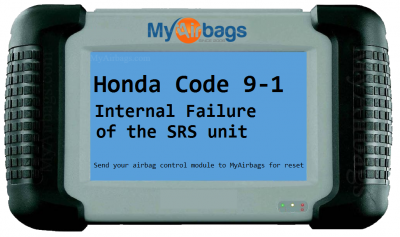SRS Airbag DTC Code: 9-1
Honda Acura SRS Airbag Code 9-1 Internal Failure of the SRS unit
If you get a code 9-1 Internal Failure of the SRS unit, this means the
vehicle was in an accident and it has crash data stored in the ACM airbag control module.
This code will not clear and won't erase with any diagnostic scan tool. It will give you the error "cannot execute routine".
How to fix/clear this code?
-
- Replace airbag control unit (new or used). We sell used air bag modules. If you purchase a new or used module, it may require additional programming to your vehicle VIN
- Send your airbag control unit to MyAirbags to have it reset. No additional programming needed, when original module reset and put back in same vehicle. Start airbag module reset
Code Description:
Control Unit Collision Decision Active
Notes:
DTC: Retrieved using scan tool.
Inspection and Repair After a Supplemental Restraint System (SRS) Deployment
WARNING: Remove restraint system diagnostic tools from the vehicle prior to road testing. If tools are not removed, the supplemental restraint system (SRS) device may not deploy in a crash. Failure to follow this instruction may result in serious personal injury or death in a crash and possibly violate vehicle safety standards.
NOTE: After diagnosing or repairing a Supplemental Restraint System (SRS), the restraint system diagnostic tools (if required) must be removed before operating the vehicle over the road.
NOTE: Deployable devices (such as air bag modules, pretensioners) may deploy alone or in various combinations depending on the impact event.
NOTE: Always refer to the appropriate workshop manual procedures prior to carrying out vehicle repairs affecting the SRS and safety belt system.
NOTE: The SRS must be fully operational and free of faults before releasing the vehicle to the customer.
All vehicles
1. NOTE: Refer to the correct removal and installation procedure for all SRS components being installed.
When any deployable device or combination of devices have deployed and/or the airbag control module (ACM/RCM) has DTC 9-1 in memory, the repair of the vehicle SRS is to include the removal of all deployed devices and the installation of new deployable devices, the removal and installation of new impact sensors and the removal and installation of a new ACM/RCM. DTCs must be cleared from all required modules after repairs are carried out.
Vehicles with Occupant Classification Sensor (OCS) system
2. NOTE: After installation of new Occupant Classification Sensor (OCS) components, carry out the Occupant Classification Sensor (OCS) System Reset procedure as instructed in the workshop manual. Refer to the appropriate workshop manual for OCS system removal and installation procedure.
When a vehicle has been involved in a collision and the Occupant Classification System Module (OCSM) has DTC 9-1 stored in memory, the repair of the OCS system is to include the following procedures for the specified system:
- For rail-type OCS system, inspect the passenger side floorpan for damage and repair as necessary. Install new OCS system rails. Do not install a new OCSM unless DTC 9-1 cannot be cleared.
- For weight sensor bolt-type OCS system, inspect the passenger side floorpan for damage and repair as necessary. Install a new seat track with OCS system weight sensor bolts. DTC must be cleared from the OCSM before carrying out Occupant Classification Sensor (OCS) System Reset. Do not install a new OCSM unless DTC 9-1 cannot be cleared.
- For bladder-type OCS system, inspect for damage and repair as necessary. If installation of an OCS system component is required, an OCS system service kit must be installed.
All vehicles
3. When any damage to the impact sensor mounting points or mounting hardware has occurred, repair or install new mounting points and mounting hardware as needed.
4. When the driver air bag module has deployed, a new clockspring must be installed.
5. New driver and/or front passenger safety belt systems (including retractors, buckles and height adjusters) must be installed if the vehicle is involved in a collision that results in deployment of the driver and/or front passenger safety belt pretensioners.
6. Inspect the entire vehicle for damage, including the following components:
- Steering column (deployable column if equipped)
- Instrument panel knee bolsters and mounting points
- Instrument panel braces and brackets
- Instrument panel and mounting points
- Seats and seat mounting points
- Safety belts, safety belt buckles and safety belt retractors.
- SRS wiring, wiring harnesses and connectors
7. After carrying out the review and inspection of the entire vehicle for damage, repair or install new components as needed.


